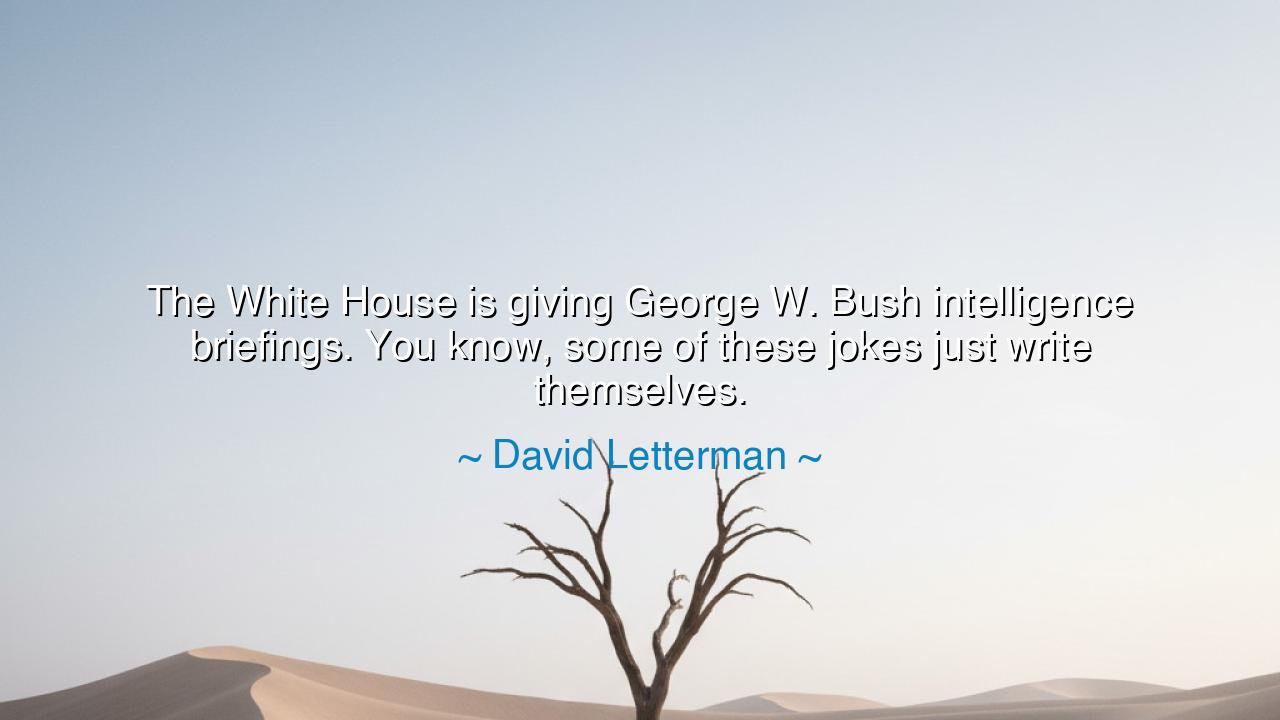
The White House is giving George W. Bush intelligence briefings.
The White House is giving George W. Bush intelligence briefings. You know, some of these jokes just write themselves.






David Letterman’s words, "The White House is giving George W. Bush intelligence briefings. You know, some of these jokes just write themselves," may strike the modern ear as a sharp and humorous critique, but within them lies a deeper reflection on power, intelligence, and the delicate balance of authority and wisdom. Letterman’s remark taps into the public perception of leadership—how the intelligence of those who lead is sometimes subject to scrutiny, particularly when it is perceived to fall short. In jest, there lies a truth that resonates throughout history: the relationship between a leader’s wisdom and the advice they receive is fraught with challenges, and the consequences of those challenges can shape the fate of nations.
The ancient Greek philosophers often questioned the nature of leadership and intelligence. Plato in his work The Republic sought to define the qualities of a good ruler, positing that those in power must possess both wisdom and the ability to discern the truth. A ruler who lacks wisdom, or one who listens only to those who echo their own opinions, risks leading a nation into peril. The humor of Letterman’s quote echoes this ancient wisdom: when a leader appears to lack the intellectual rigor necessary for the weight of their responsibilities, it becomes fodder for both public jest and serious reflection. Just as Socrates questioned the wisdom of those in power in Athens, so does Letterman subtly point to the importance of intelligence in governance.
Consider the life of Emperor Nero, whose reign was marked by extravagance, poor judgment, and a tragic lack of wisdom. Though Nero had advisors, he often dismissed their counsel in favor of his own whims. His decisions led to the downfall of his rule and the destabilization of the Roman Empire. Here, we see that when a leader disregards the intelligence of their advisors, or when the advice they receive is ineffective, the consequences can be disastrous. Letterman’s joke, though born of humor, highlights this timeless lesson: that intelligence must flow freely between those in power and those who advise them. The integrity of that flow determines the fate of empires, nations, and leaders themselves.
The joke that Letterman delivers serves as a critique of the perceived gap between the office of the president and the quality of the information the president is receiving. In many ways, it mirrors the public perception that a leader's success often depends not only on their own wisdom but on the ability to surround themselves with trusted advisors who challenge their assumptions and guide their decisions. History has shown that the greatest leaders—such as Abraham Lincoln, who assembled a "team of rivals" in his cabinet—understood the necessity of surrounding themselves with individuals who would offer honest, critical feedback. Lincoln did not want only to hear what he wanted to hear; he wanted advisors who would speak truth to power.
In this, there is an essential lesson: that leadership is not merely a matter of holding power or issuing commands, but of receiving and acting on intelligence—whether it comes from advisors, the public, or even one’s own reflection. A great leader knows that they are only as strong as the counsel they take to heart. To be wise in leadership is to remain open to learning, even in the face of overwhelming power. George W. Bush, as Letterman’s joke suggests, was sometimes seen as lacking in this respect, which invites us to reflect on the importance of self-awareness in those who lead. The truly wise leader recognizes that they are not infallible but that wisdom comes from the interplay of knowledge, humility, and the willingness to change course when necessary.
In our own lives, the lesson is clear: humility is the key to growth and success. Whether we lead in a political sense, in our families, or in our personal ambitions, it is essential to recognize the value of intelligence—not just our own, but the wisdom of those around us. Just as the ancients emphasized the importance of a ruler who listens and learns, we must apply this wisdom in our own actions. We must surround ourselves with voices that challenge us, that offer truths that we may not want to hear but that we need to grow.
Thus, the practical action we must take is simple but profound: listen more deeply, seek out those whose intelligence can illuminate blind spots, and be open to learning even from those who challenge us. Leadership, in any form, is not about dominating the conversation but about fostering an environment where wisdom and intelligence can flow freely. And, as Letterman so cleverly points out, the humor found in the mismatch between power and intelligence is a reminder that the true strength of any leader lies not in their ability to command but in their capacity to listen, learn, and act upon the knowledge they receive.






AAdministratorAdministrator
Welcome, honored guests. Please leave a comment, we will respond soon